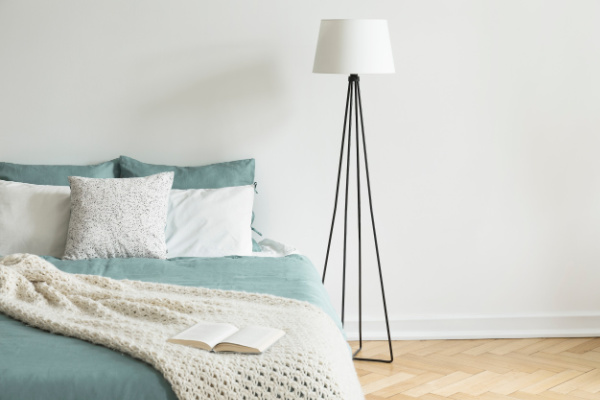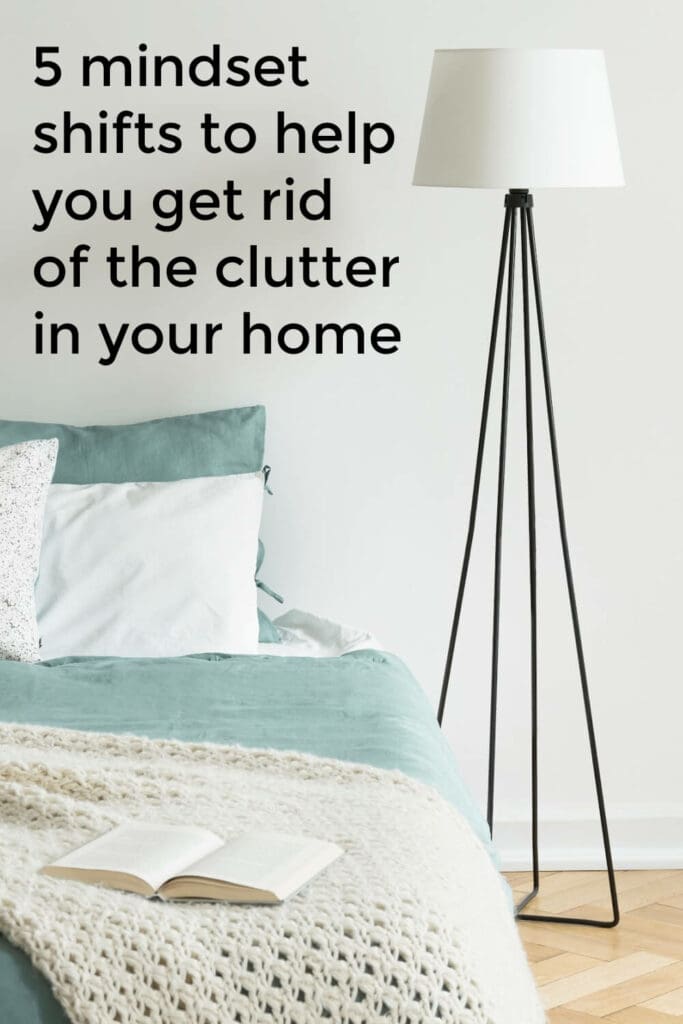5 Mindset Shifts to Help You Get Rid of the Clutter in Your Home

I’m going to go out on a limb and assume that you have struggled to declutter; maybe you’ve struggled with the decisions, or maybe you’ve struggled with just the idea of getting rid of clutter.
All those things that seem like clutter until you try to make a decision and then seem too valuable to release.
There are people who can throw things out all day long, and the only exhaustion they feel is because of the physical work they are doing.
Those people don’t search the internet for “How to get rid of clutter.”
So, if you’re here, please know that there is a big group of us who needed help, needed a starting point, and needed to learn how to get rid of things.
Decluttering is typically not an easy thing to do.
Most of us do not want to have to make the decision to get rid of things, and we don’t want to decide in what way to get rid of them – and if we’re faced with throwing them in the dump or keeping them, we tend to choose to keep them.
This is why decluttering is like peeling off layers of an onion. It’s hard to peel more than one layer at a time. But we can get down to the essentials if we work layer by layer.
I like the stuff I had – antiques and things I inherited—unique items, from people who loved me.
Sure, there were some things that I kept out of guilt or obligation, but in general, I liked the stuff that I had collected.
And when I talk here about reducing your possessions so that your home becomes easy to maintain, I know the decluttering process will NOT be easy.
You will have to make decisions you don’t want to make.
It’s hard to make the decision to get rid of things, to get rid of sentimental things, and to get rid of things that no one wants, to get rid of craft supplies – to essentially get rid of all those possibilities and all the different versions of yourself that you could be.
And that is hard, especially if you grew up with Depression-era parents who taught you to keep and reuse EVERYTHING because things were hard to come by.
Could that happen again?
Yes.
Is that a good reason to hold onto everything and allow our home to be a storeroom?
No.
1. Keep the end goal in mind.
I was not naturally a clean and tidy person. But I wanted a clean and tidy space. To achieve that, I had to do two things: I had to learn how to clean daily (cleaning routines), and I had to reduce the amount of possessions that I had so that my home was easier to clean on a daily basis.
My goal was stupid-easy.
It had to be SO EASY that it would feel silly for me to procrastinate on it.
By reducing the number of items I was shuffling daily, those cleaning routines got faster and easier.
As I looked at the cute items I had amassed, I had to keep in mind: does this item make it easy to keep a clean house?
And truly, MOST things made it more difficult to keep a clean house.
- Extra dishes made it harder to stack them in the cupboard.
- All the cute decor on the shelves made it harder to dust.
- More beauty products in the bathroom meant the counter was hard to keep clear.
- Extra clothes meant Laundry piled up in a dirty pile or on the couch needing to be folded because everything felt like such a big job.
I had to drastically reduce my physical possessions to make it easier to keep a clean and tidy house.
Remembering “I want to have a house that is easy to maintain” gave me the right perspective when I was deciding whether I should keep something or declutter something.
2. Decide to make hard decisions
I had a pretty little doll buggy. It belonged to my Grandmother, who was born in 1907. My mom and I played with it, but then it started to fall apart, so I didn’t allow my daughter to play with it. Instead, it sat in the basement. Shoved in a corner, collecting dust.
Could I sell it? Yes – I saw on eBay they were selling for around $100.
Have I ever sold anything on eBay?
No.
Would I actually sell it now?
No.
I honestly hate selling things that way – I don’t like taking pictures, figuring out prices, writing descriptions, answering questions, packing and shipping…
The truth is, if I had to have a separate task or errand in order to declutter something, I wouldn’t declutter it. I’d just leave it there collecting dust because I don’t want to deal with it.
Finally, I put the pretty little doll carriage in a box and took it to the donation center.
I like to think that someone picked it up at the thrift store, was super pleased, and took it home to restore and enjoy it.
But the reality is, I have no idea.
That was a hard decision to make.
But I don’t regret making it.
3. Accept you have to throw some things away.
When things are not good enough to go to the thrift store but seem too good to throw away, what do we do?
Many people in my decluttering group have found takers in a local buy-nothing group. And there are some cities that have an artist Maker-Space that will take donations for artists to use.
But sometimes, no one wants it, and the choice is to throw it away or store it.
If something has water or rodent damage, it needs to be thrown away. It’s not healthy to live with mold or rodent residue.
Just because we know something needs to be done doesn’t mean it’s easy.
It will still be emotionally difficult to put things in a dumpster.
There may be tears. There may be grieving. But you can still do it and come out stronger on the other side.
Keeping ruined things that no one wants is not saving them. It’s only creating a burden on ourselves. Keeping things so they don’t end up in the landfill is only making our home a holding station for the landfill.
If we have a house full of things that no one wants, but we continue to store it, and if we die today, what will happen to all that stuff?
Someone we love will have to remove it from our home and haul it to the landfill. In the end, we will not prevent anything from filling the landfill, we will burden our loved ones with a lot of work, and we will never experience a clean and tidy home that we enjoy.
What will you pick if you have to choose between storing the stuff and having a clean and enjoyable space to live in?
It’s not easy to follow through with that decision; it will still be emotionally draining, but you can do it, and you can have a home you enjoy.
4. Keep things that are relevant to your current life.
I was recently watching a decluttering video from Joyful Living with Jen Lefforge. She recorded a full house declutter as part of her Swedish Death Cleaning, and she talked about a mindset shift that happened so she was able to dispose of things that had been taking up space in her life for far too long.
One of the shifts she talks about is how we change as people and that it’s okay to release belongings from someone you are no longer.
I used to be an avid scrapbooker.
I had so much money wrapped up in supplies – at one point, I even sold Creative Memories, so I had products that I stored and tons of paper and stickers.
I realized that I did a lot of things and occupied my time with many hobbies when I was married to my first husband because it gave me a way to escape. It was a very unhealthy relationship, and pouring myself into these detailed crafts was how I coped with the stress in my life.
When I decided to embrace minimalism, I was about eight years removed from that marriage – but I had kept all the supplies.
Letting go of them was hard – I had found so much comfort during those difficult years by having that creative outlet.
But I wasn’t that person anymore, and holding onto all the supplies wasn’t helping me in any way. In fact, it was causing more harm because I felt guilty for spending all that money and having it just sit in the basement.
You may also need to consider the fantasy self – the person you envisioned yourself to be, but aren’t.
5. Change what you value.
We get to choose what we value.
To give space to things in our homes, we believe them to be valuable enough to keep them.
But when we put value on things that are not being used by us, we are devaluing ourselves and how we spend our time.
What do I mean?
If we have a room full of things, we think about about those things. Perhaps we think about what we should be doing with them, repairing, selling, reorganizing, finding homes for them…
And we don’t consider the amount of stress that causes us. The mental strain, or even the amount of energy we spend procrastinating on doing anything about said items.
Because we put more value on those items than we put on ourselves.
Letting go of unnecessary things means we are putting our needs above the material items in our homes.
Are the things in your home serving you and being useful to you? Or are they draining you of time and energy?
If you need ideas on how to dispose of things in an eco-friendly way, click here. Or, if you need reasons why would shouldn’t save things for a garage sale, click here.


This article made a lot of sense to me. I put off getting rid of things because I want to sell them instead of donate them. Seldom do I ever put an ad on Facebook to sell my items so they just end up taking up space in my house and in my head. Great article and suggestions!
Love this article
This is the BEST article about decluttering I have ever read, and I read a lot of them!! Your understanding of how hard it is and the in-depth way you communicated that by delving into specific areas such as, grieving, our current selves vs past selves and our real selves vs fantasy, was truly inspiring! I came away with new ways to look at the task of decluttering. Thank you!